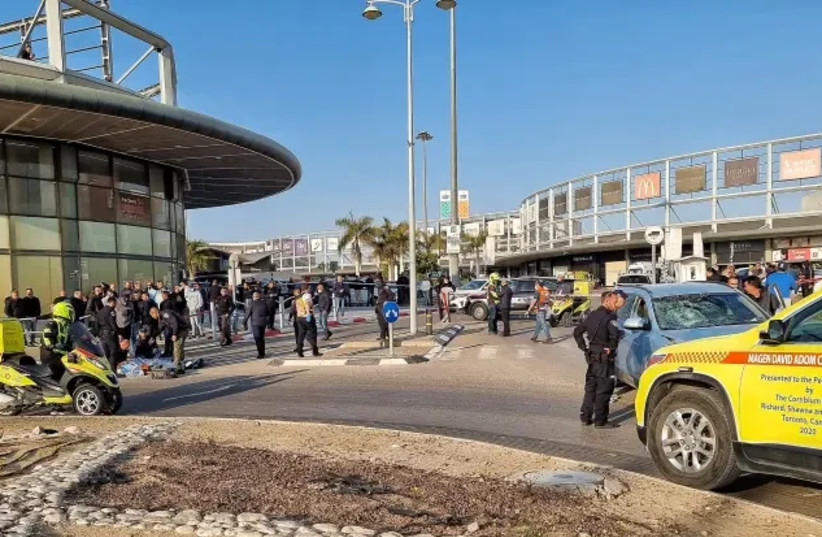Members of the Knesset and NGOs requested that the Israel Police change the regulations for police investigations into the uses of firearms in self-defense at a Monday morning National Security Committee session, after complaints by civilians of unfair treatment.
Police will respond to the request at a scheduled hearing in four months, said committee chairman Simon Moshiashvili.
The issue was raised by Likud MK Amit Halevi who said that dozens of voters had appealed to him after unfair treatment.
Halevi showed the video of an incident in which a terrorist in Beersheba was shot by an armed civilian, ending the stabber's killing spree.
"Instead of getting a medal," for using the weapon as intended, said Halevi, the armed civilian received an "investigation by the police, was fingerprinted, had his weapons checked, and all the things done to a suspect."

Halevi cited another incident in which a man had shot in the air to scare off people throwing stones, and their weapon was taken away, leaving them unprotected. In this case, the man was still unarmed when he was at Tel Aviv's Dizengoff Street in 2022 when there was a deadly terrorist attack. Civilians at the hearing expressed that they were concerned about reprisals when they were left unarmed.
"The main story here is the default of an investigation with a warning and the seizure of the weapon, and it must change," said Religious Zionist Party MK Tzvi Sukkot. "In the tense time in which we live today, a person is left without the possibility of defending himself and needs to renew the weapons license again in a long process."
Changing rules for Israeli civilians using guns in self-defense
Critics at the hearing argued that if it is determined that civilians need firearms to ensure their safety, denying them a weapon is to compromise their safety. A Honenu representative said that people would be afraid to report shootings because they didn't want their firearms seized, and another witness said that the taking of guns could be seen as a punishment.
A representative from the National Security Ministry reminded everyone that the government was still dealing with a backlog in weapon licensing, which was being alleviated by new measures implemented in recent months by National Security Minister Itamar Ben-Gvir.
MK Ariel Kallner argued that armed citizenry had contributed greatly in the countering of terrorist activity and should be encouraged and that if this is a person trusted enough to be given a license to have a weapon, then they shouldn't be viewed with automatic suspicion by law enforcement. Honenu argued that this created conditions in which citizens were afraid to discharge their firearms at all.
Halevi noted that there was supposed to be a change in the regulation regarding how the police treated civilians in May 2021, but it appeared that the old procedures were still in effect.
A representative from the Police Internal Investigations Unit (Machash) said that the police chief had approved new regulations, but they had been sent to the National Security Ministry for review.
Under current police procedures, it was explained that it is at the district commanding officer's discretion to take a weapon and to provide a weapon or police protection, to investigate the shooter or detain them.
The Machash representative explained that the situation was not always clear in cases of self-defense, and some investigation was required to determine what really happened. Unlike the Beersheba incident, there wasn't always a video to aid police with understanding an incident. Not every incident is understood at the moment and therefore needs to be investigated, said a representative of the Attorney-General's Office.
"Sometimes we think he is a terrorist and he isn't," noted the officer. "Sometimes he has a mental illness."
In situations in which there are IDF, police and civilians shooting in the same area, the Machash officer explained that the police investigate to understand who shot and who hit. They need to know if weapons are working properly. The officer noted that there is a need, in general, to differentiate between self-defense against criminal action and terrorist attacks.
"When someone dies we need to investigate," said the officer. The Honenu representative noted that a shooting doesn't always result in death, it can also lead to injury or can be an incident in which warning shots are fired in the air.
In cases of self-defense, the officer said that shooters are given immediate access to legal consultation.
"We're talking about a few incidents – not every investigation ends with an indictment," said the officer.
The State Attorney's Office said that each situation was different and was treated differently depending on the facts of the case, though they weren't involved in the regulation. Likud MK Moshe Saada said that not every shooting should be treated with suspicion, and many could be dismissed quickly.
Saada, himself a former Machash deputy head, argued that the regulations for investigating police officers also had to be reviewed.
"The difference between a medal and indictment is very thin," Saada noted.
He recalled a 2021 Jerusalem Damascus Gate terrorist attack in which two border police officers shot the terrorist and then were placed under investigation as suspects.
Saada said that a change was needed in which all the evidence was collected to and presented to the State Attorney's Office, and only then a course of action was decided. He said that this was the case in the past, and accused changes by former attorney-general Avichai Mandelblit leading to officers being afraid to shoot.
"If officers are afraid to shoot, it's the civilians that are hurt," said Saada.
